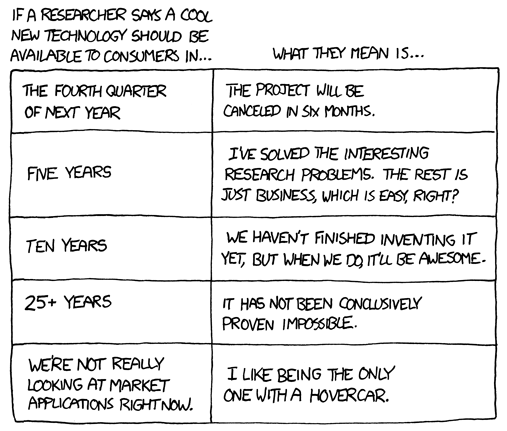Toyota set to sell long-range, fast-charging electric cars in 2022: paper
Only one local (but closest to Toyota) released this news in Japan today.
Only one local (but closest to Toyota) released this news in Japan today.
You can install our site as a web app on your iOS device by utilizing the Add to Home Screen feature in Safari. Please see this thread for more details on this.
Note: This feature may not be available in some browsers.
Toyota set to sell long-range, fast-charging electric cars in 2022: paper
Only one local (but closest to Toyota) released this news in Japan today.

Is solid-state really that much better? If so, I would assume Tesla is working on it for the future.
Is solid-state really that much better? If so, I would assume Tesla is working on it for the future.

.... with possible exception for the Musk Reality Distortion Field
When a traditional automaker says "a competitive EV in five years", it's like they don't even understand what's happening. That they don't realize how fast of a moving target they're talking about. Look at the situation GM finds itself in with the Bolt. They're actually trying, and yet more people are putting their money down on the Model 3, an EV that hasn't even had a full reveal yet, than are buying theirs. If GM was "late to the game" on this one, how on Earth can a company like Toyota think that they'll just be able to just jump into the game in 2022?
Don't forget the lack of a charging network which would enable long distance travel.People NOT buying the Bolt but holding out for the Model 3 is more a marketing problem for GM than the fact that the Bolt is a crappy car. The Bolt is getting good reviews. I see the Bolt's main problem "marketing not withstanding" that it is "still a compact car" and can still go north of $40K (before any incentives are applied). It is NOT advertised, and it is still a little funky "dorky" looking and it has no "swag".
Obviously if they choose to bring their cash and manufacturing capabilities to bear on building a long range BEV I've no doubt they could do so perhaps sooner than that.
Because Toyota is the worlds number one volume auto maker. Obviously if they choose to bring their cash and manufacturing capabilities to bear on building a long range BEV I've no doubt they could do so perhaps sooner than that. People NOT buying the Bolt but holding out for the Model 3 is more a marketing problem for GM than the fact that the Bolt is a crappy car. The Bolt is getting good reviews. I see the Bolt's main problem "marketing not withstanding" that it is "still a compact car" and can still go north of $40K (before any incentives are applied). It is NOT advertised, and it is still a little funky "dorky" looking and it has no "swag".
Shhhh... most of the plug-in cars in the USA and Canada are Chevrolets. Not Teslas, not Toyotas, not Nissans. Don't let anybody know. They are disguised as pickups I'm told to hide them.
I am not sure this is the right place to ask this question, but here it goes. Hypothetically lets say solid state batteries become viable and better batteries than lithium ion batteries for electric cars in 5 years. How likely do you think that Tesla would be leapfrogged, in this scenario, by another automotive company who is able to make their first gigafactories solid state and are thus not tied to an older lithium ion battery produced by older gigafactories?
I am not sure this is the right place to ask this question, but here it goes. Hypothetically lets say solid state batteries become viable and better batteries than lithium ion batteries for electric cars in 5 years. How likely do you think that Tesla would be leapfrogged, in this scenario, by another automotive company who is able to make their first gigafactories solid state and are thus not tied to an older lithium ion battery produced by older gigafactories?
When a traditional automaker says "a competitive EV in five years", it's like they don't even understand what's happening...
....how on Earth can a company like Toyota think that they'll just be able to just jump into the game in 2022?


